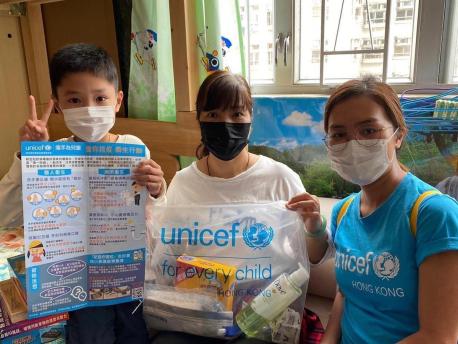
UNICEF Partners Step Up to Protect Children From COVID-19
Corporate partners are pitching in to support UNICEF's lifesaving work around the world during the novel coronavirus pandemic.
From the earliest days of the COVID-19 pandemic, UNICEF has been on the front lines, providing the supplies and services urgently required to keep communities safe and children healthy, happy and learning.
To meet the sudden, huge demand for personal protective gear and lifesaving medical equipment, UNICEF immediately activated its global network of suppliers and shipping partners, rushing materials where they were needed most. By the end of November, UNICEF Supply Division had sent 174.9 million surgical masks, 13 million N95 masks, 4.5 million gowns, 104.8 million gloves, 15,468 oxygen concentrators, 2.7 million diagnostic testing kits for COVID-19 and more to support pandemic response efforts in 135 countries.
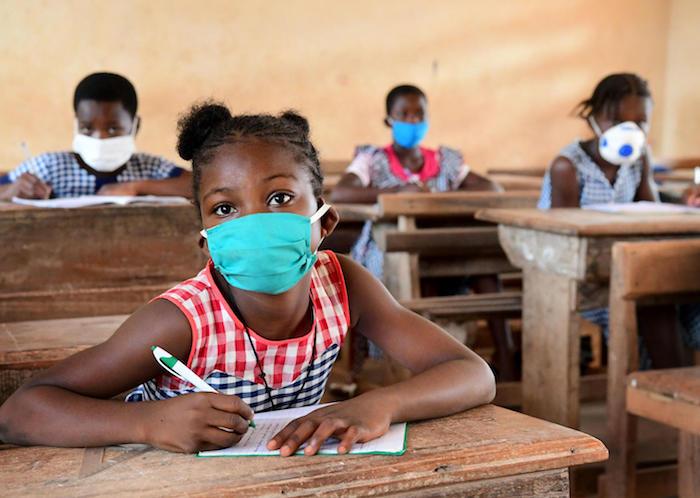
Students wear masks and leave empty desks to prevent transmission of the novel coronavirus during classes at the UNICEF-supported primary school of San Pedro, in the South West of Côte d'Ivoire. © UNICEF/UNI330861/Dejongh
When mass school closures disrupted the learning of 91 percent of students worldwide, UNICEF education staff raced to provide alternate forms of instruction, from delivering education materials to children at home to implementing online, radio and TV classes, and developed guidelines to help schools reopen safely.
To spread the word about the importance of handwashing to prevent the spread of infection, UNICEF community health workers fanned out worldwide, reaching more than 2.5 billion people. Now, as safe and effective vaccine candidates begin to emerge from the trial phase, UNICEF is laying the groundwork for a massive COVID-19 vaccine procurement and delivery operation.
UNICEF partners are leveraging their resources and expertise to combat COVID-19 and protect children
None of this critical work during an unprecedented global health crisis would be possible without the generous support of UNICEF's public and private partners. Below, a look at how some essential corporate partners are leveraging their resources and expertise to join the fight.
To help those most threatened by the novel coronavirus, Kimberly-Clark donated $2.5 million to UNICEF and its programs focused on preventing the spread of the virus, including providing hygiene and medical kits to schools and health facilities, as well as efforts to increase children's access to health, education and social services during the pandemic.
"Through these donations, we can help support those working on the front lines of this global health crisis," said Kimberly-Clark Foundation Vice President Jenny Lewis. "As the virus spreads to nearly every country on Earth, we must accelerate the delivery of care to those who are most vulnerable."
Kimberly-Clark has committed to donations totaling more than $8 million to assist COVID-19 response and recovery efforts around the world.
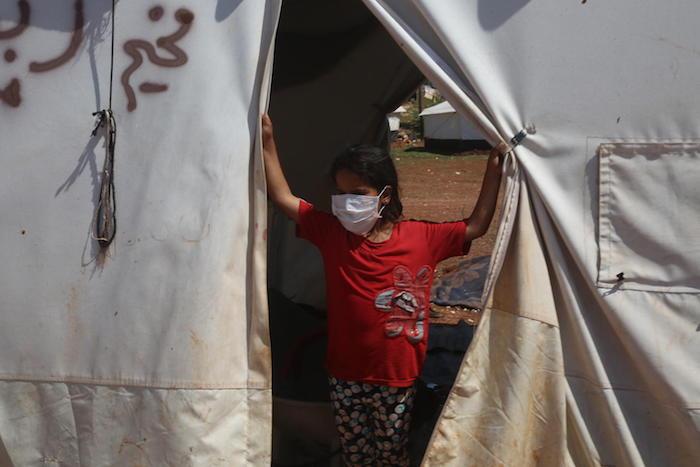
On April 19, 2020, a girl wears a mask provided by UNICEF volunteers who visited a tent camp for displaced people near the town of Kafr Yahmoul, north of Idlib, Syria. The volunteers shared messaging about how to stay safe and healthy during the time of the COVID-19 outbreak. © UNICEF/UNI322979/Albam
Building on their previous commitment to UNICEF's emergency response programming via UNICEF USA's Mercury Fund, longtime partner S&P Global Foundation is supporting UNICEF's COVID-19 Fund, providing prevention, education and handwashing materials, medical supplies and support for children and families globally.
"As the impact of COVID-19 is felt across the world, S&P Global is committed to supporting relief efforts to aid our global community," said Annette O'Hanlon, Chief Corporate Responsibility & Diversity Officer and President of the S&P Global Foundation. "We are hopeful that these funds can make an immediate and meaningful impact for those on the front lines saving lives, caring for the sick and vulnerable, and working to bring an end to this pandemic."
In total, the S&P Global Foundation has allocated $4 million in grants to assist COVID-19 response and recovery efforts around the world. In addition, the Foundation is amplifying S&P Global employees support of global COVID-19 response by doubling contributions made through the company's Disaster Relief Matching Gift Program.
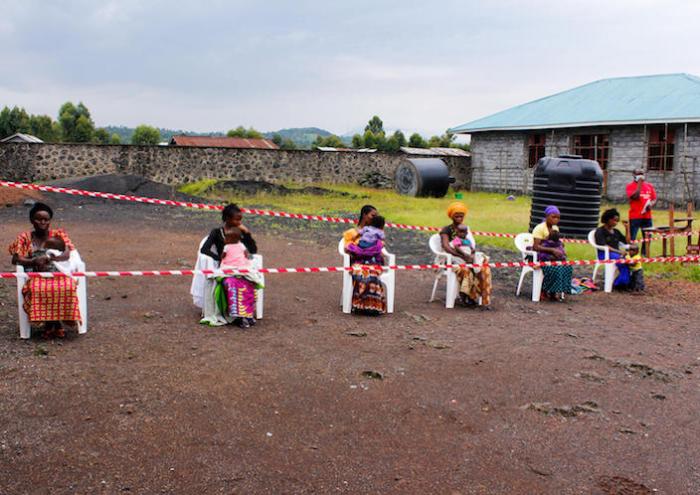
On April 21, 2020 in Goma, capital of North Kivu province, Democratic Republic of the Congo, mothers sit far apart to prevent the spread of COVID-19 while waiting to have their children vaccinated against measles. As the world's largest procurer of vaccines, UNICEF is working with governments to ensure countries can continue to reach children with lifesaving immunizations during the COVID-19 crisis. © UNICEF/UNI325344/
Recognizing the impact of the COVID-19 pandemic, Prudential Financial moved quickly to aid response efforts, both locally and internationally. A premier emergency partner of UNICEF's since 2006, Prudential supports both the UNICEF USA Bridge Fund, an innovative finance tool that expedites the transfer of funds during an emergency, and the Mercury Fund, another tool providing rapid, flexible funding to countries that need it most. Both funds have been utilized to advance funds at the outset of the pandemic.
In addition to this longstanding support, Prudential's $75,000 grant has helped UNICEF's COVID-19 response, supporting the delivery of personal protective equipment (PPE) to frontline health workers, distance learning to millions of children and prevention messaging to communities around the world.
The Visa Foundation is supporting nonprofit organizations best suited to address the urgent need of immediate COVID-19 emergency relief. The Foundation has committed a total of $1 million to UNICEF's response in Europe and Latin America and the Caribbean.
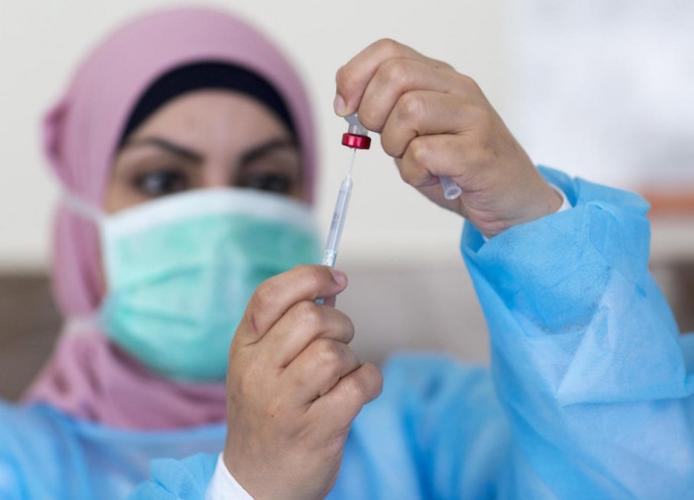
By the end of the year, 520 million syringes will be prepositioned in UNICEF warehouses, part of a global plan to ready critical equipment for a COVID-19 immunization campaign in 2021. On May 3, 2020, nurse Hana Barakat fills a syringe at the Ministry of Health clinic in Ramallah, State of Palestine. © UNICEF/UNI347513/Izhiman
As manufacturers rush to complete testing on a safe and effective COVID-19 vaccine, UNICEF is gearing up for what is expected to be one of the world’s largest and fastest immunization campaigns ever. The equitable distribution of the vaccine will take a united effort, including commitments from the public and private sector.
As part of COVAX, the COVID-19 Vaccine Global Access Facility, UNICEF will be in charge of supplying vaccine doses to 92 low- and middle-income countries.
Gucci, a longtime UNICEF supporter, is donating $500,000 to support UNICEF’s work on the equitable distribution of the COVID-19 vaccine. To encourage global solidarity for this work and further calling on its community, Gucci will also match funds raised for UNICEF's work, dollar for dollar up to an additional $100,000 through the “21 Days Challenge." Contributions made from Dec. 5 until Dec. 26, 2020 are eligible for this match.
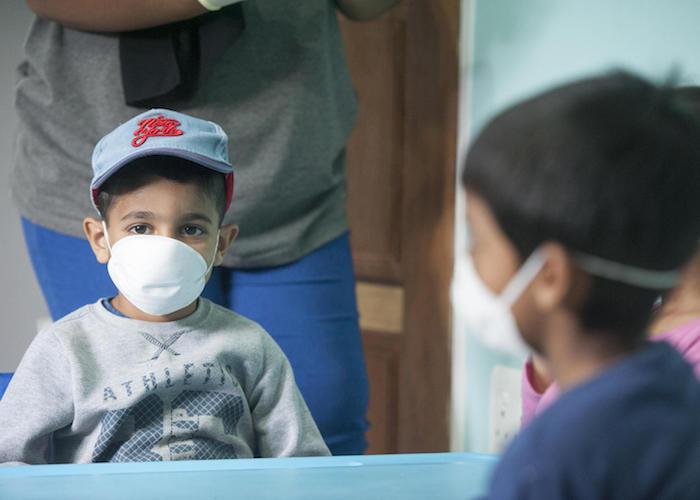
Young learners are seen wearing masks at a preschool in Lenasia, Johannesburg, South Africa on March 17, 2020. © UNICEF/UNI316642/Mohamed
The Medtronic Foundation has partnered with UNICEF's COVID-19 fund to support health workers and ensure health service continuity for impacted communities. Funding will support both frontline health workers through training and the provision of PPE and preparedness efforts for the health system and workforce to improve surge capacity and continued care for chronic and at-risk patients. This is part of the Medtronic Foundation's commitment to provide $11 million in support of global and local organizations responding to COVID-19.
"With roots in the world's largest medical technology company, the Medtronic Foundation has a responsibility to be a leader on global issues impacting access to health care," said Paurvi Bhatt, president of the Medtronic Foundation. "During this unprecedented global health crisis, we are committed to supporting and equipping the courageous frontline health workers who are delivering critical care to those in need."
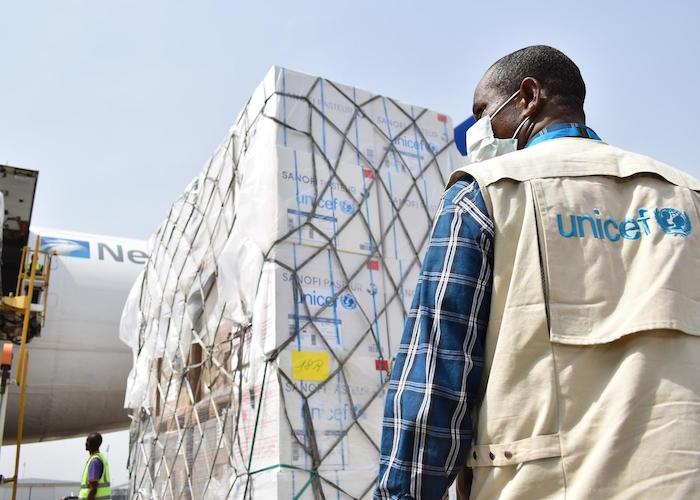
On April 16, 2020 a UNICEF shipment of vital health supplies to support the fight against the COVID-19 pandemic arrived in Nigeria. © UNICEF/UNI322100/
YouTube committed a $250,000 grant to support UNICEF's global response to COVID-19. This commitment was announced during a campaign hosted by UNICEF Goodwill Ambassador Lilly Singh on her YouTube channel in an effort to raise funds to reduce the impact of the pandemic on children, youth and their care providers. YouTube also pledged a $10,000 match to the fundraising campaign.
Lilly Singh's COVID-19 Q&A with Dr. Anthony Fauci has been viewed well over 6 million times on YouTube
In the March 27 video, which has reached well over 6 million viewers, Singh spoke with Dr. Anthony Fauci, Director of the National Institute of Allergy and Infectious Diseases, to share factual, authoritative information about how to prevent the spread of the novel coronavirus, and how to separate truth from rumor. The program was aimed at a younger audience that might not receive public health messages from more traditional sources.
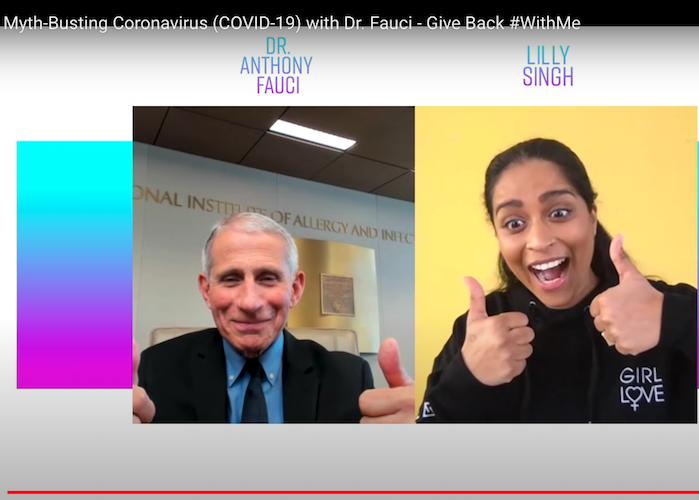
In a popular YouTube video, UNICEF Goodwill Ambassador Lilly Singh spoke with Dr. Anthony Fauci, Director of the National Institute of Allergy and Infectious Diseases, about how to stay safe from the novel coronavirus, and how to separate fact from fiction. © YouTube
The travel sector, one of the hardest hit economically during this crisis, is also finding ways to support relief delivery. Building on UNICEF's 20-plus year partnership with Marriott International, Marriott Bonvoy members can donate their loyalty points, which are then converted to cash contributions. Members have already donated nearly 5 million points to support UNICEF's work.
American Airlines partners with UNICEF through its participation in the Global Change for Good program. Travelers on selected international American Airlines flights can donate unused U.S. and foreign currencies on board the aircraft to support UNICEF's programs. In 2019, American Airlines flight attendant volunteers, called Champions for Children, collected more than $1.2 million from passengers to support UNICEF's mission to meet the basic rights of every child.
To support UNICEF's response to the COVID-19 pandemic, American is allocating a portion of what was collected last year to assist UNICEF's response in key markets to serve the needs of those who are most at risk.
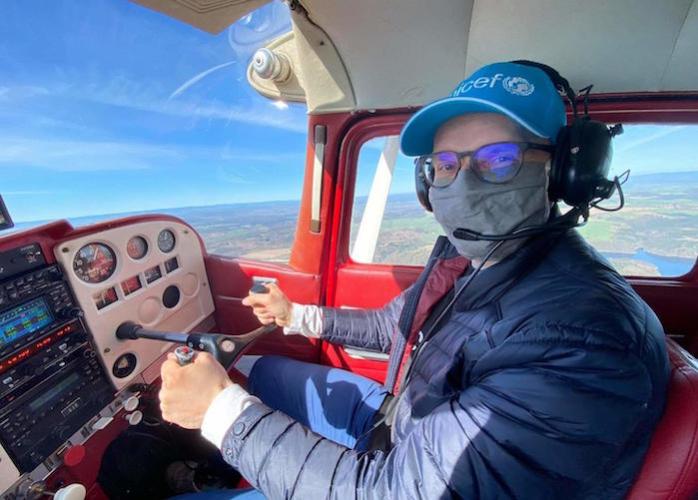
Six hundred pounds of UNICEF hygiene kits were airlifted to South Bohemia in the Czech Republic on April 16, 2020. © UNICEF/UNI323217
Along with supporting its partners and employees in communities globally, Xylem Watermark, Xylem's corporate social responsibility program, is supporting best-in-class international partners working on the response to COVID-19. Xylem Watermark's COVID-19 contribution will be directed to the most at-risk communities, providing critical supplies and supporting infection prevention and control activities through UNICEF's community health programs and youth engagement initiatives.
"We're inspired by the action and altruism we're seeing in so many places," said Joseph Vesey, Senior Vice President of Marketing and Chair of Xylem Watermark. "I have been moved by the philanthropic actions of our people and our partners, as well as countless actions of others supporting communities most in need."
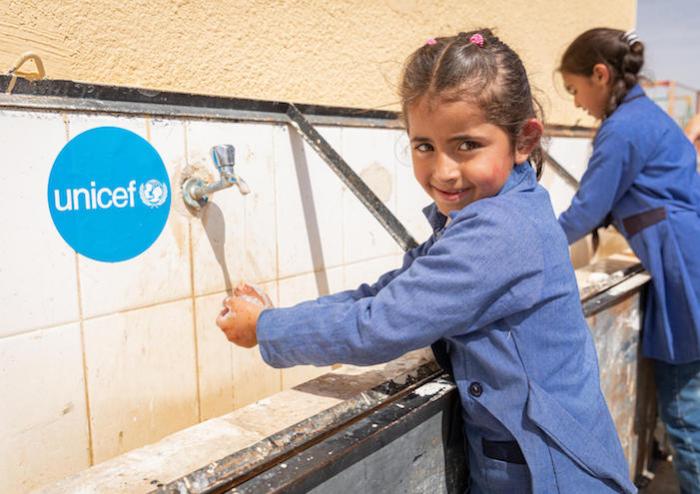
To prevent the spread of the novel coronavirus, Dareen, 6, washes her hands at a wash station set up by UNICEF in Jordan in 2020. "I wash my hands so germs don't get on them," she says. "Germs can make people sick or even kill them." © UNICEF/UNI313299/Matas
On April 20, UNICEF and Microsoft announced the expansion of a global online learning platform to help children and youth affected by COVID-19 continue their education at home. The Learning Passport began as a partnership between UNICEF, Microsoft and the University of Cambridge designed to provide education for displaced and refugee children through a digital remote learning platform.
UNICEF and Microsoft's online learning platform helps out-of-school children and youth continue their education during the pandemic
The project was rapidly expanded to facilitate country-level curriculum for students whose schools have been closed to prevent the spread of the novel coronavirus. More than 190 countries have closed their schools since the outbreak began. The new platform, already in use in Kosovo, Timor-Leste and Ukraine, also provides key resources for teachers and educators.
"From school closures, to isolation, to a persistent sense of fear and anxiety, the effects of this pandemic are impacting childhoods worldwide," said Henrietta Fore, UNICEF Executive Director. "We need to come together and explore every avenue to keep children learning and help them through this difficult time. And with partners like Microsoft, we are able to swiftly deploy innovative, scalable solutions for children and youth. The adaptations made to the Learning Passport are a powerful reminder of what we can achieve together with our partners for children as the crisis deepens globally."
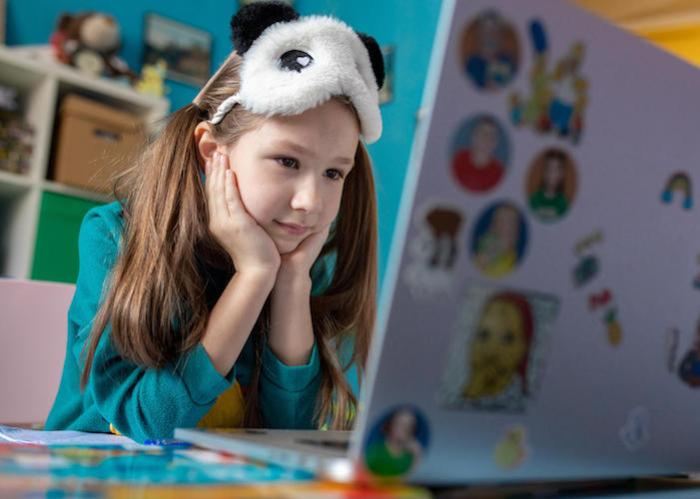
On April 15, 2020 in Kyiv, Ukraine, 7-year-old Zlata works on a school assignment from home using the Learning Passport, a global online learning platform developed by UNICEF, Microsoft and the University of Cambridge to help out-of-school children continue their education. Schools have closed in more than 190 countries to prevent the spread of the novel coronavirus, disrupting the lives of more than 1.5 billion students. © UNICEF/UNI321764/Filippov
The Clarios Foundation pledged $100,000 to UNICEF's COVID-19 global relief efforts and is using a GoFundMe campaign to channel the collective momentum of concerned employees, customers and stakeholders to ensure that children and families receive supplies and information to reduce the impact of the global pandemic. "These funds will have immediate and meaningful impact for children and those on the front lines saving lives, caring for the sick and vulnerable, and working to bring an end to this pandemic," said John Barkhouse, Clarios interim CEO and chairman. "UNICEF's vision aligns closely with Clarios, as we seek better solutions that advance the profound impact we can have on those who call our planet home."
EPAM Systems Inc., a leading global provider of digital platform engineering and software development services, contributed $400,000 to support UNICEF's COVID-19 response. UNICEF Ukraine received $200,000 in direct support and $200,000 went to support the global COVID-19 response fund.
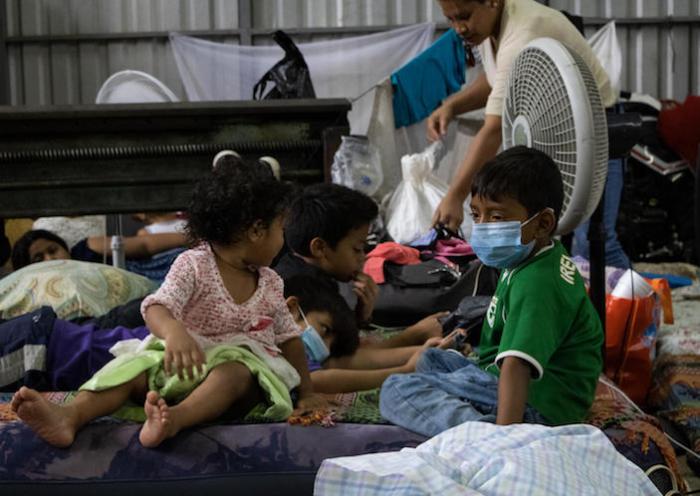
When back-to-back Hurricanes Eta and Iota hit Central America in November 2020, families crowded into improvised shelters like this one in San Pedro Sula, Honduras. UNICEF and partners delivered lifesaving supplies, including masks and hygiene kits, to help children stay safe. © UNICEF/UN0372330/Girón/AFP-Service
"We've seen tremendous disruption brought forth by the COVID-19 crisis," said Arkadiy Dobkin, CEO & President, EPAM Systems, Inc. "Our focus has been directed first and foremost on ensuring the safety and security of our people around the world, as well as the communities in which we all live and work. Our partnership with UNICEF has been an important part of our collective global response, which has included more than $1.5 million in resource contributions, as well as a significant number of open source and community relief efforts across more than 15 countries."
UNICEF is working to ensure that the global COVID-19 response doesn't endanger decades of progress against vaccine-preventable diseases
With school closures, job disruptions and food insecurity affecting children and families worldwide, Roblox supported UNICEF and other organizations to help COVID-19 relief and recovery efforts through the offering of a series of limited-edition virtual items which members of their community can purchase.
For each item purchased by June 30, Roblox donated a matching amount (based on a value of $0.01 per Robux) to the organization the item is associated with, up to a combined total of $1 million. Roblox also donated an additional $1 million among the organizations. This support helped UNICEF distribute essential supplies such as safe water, soap, medical supplies and PPE to where they're needed most around the world.
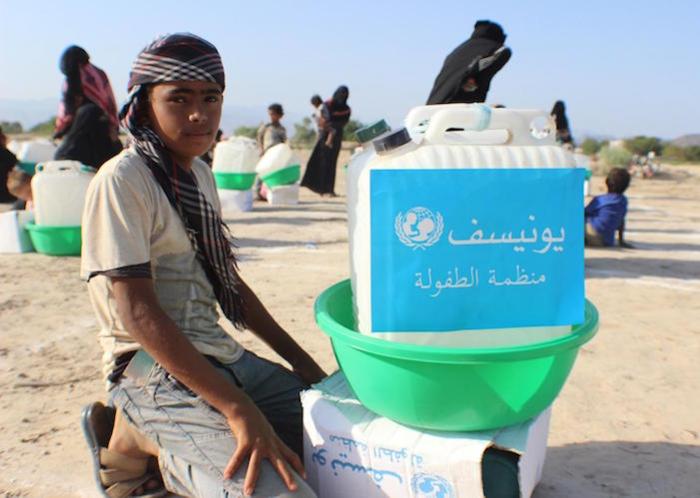
On April 27, 2020 in Abyan, Yemen, families displaced by insecurity collect UNICEF hygiene kits containing soap, laundry detergent, jerry cans for carrying water, buckets and sanitary pads. The kits provide dignity to families and allow them to practice effective handwashing techniques and hygiene to protect themselves from the novel coronavirus. © UNICEF/UNI324884/
Bethesda Softworks, a worldwide video game publisher, pledged $250,000 to help scale up and deliver COVID-19 messaging, deliver critical WASH supplies, reach millions of children with distance learning, and provide children and parents and caregivers with community-based mental health and psychosocial support.
Target has been focused on supporting their team members and serving their guests in their communities, and has committed $10 million to coronavirus relief and response efforts. As part of that donation, it has committed $1 million to those providing critical support globally, including UNICEF.
WarnerMedia, Cox Communications, AT&T Sports and JCDecaux have all donated advertising space to promote key public health messaging and highlight resources for families coping with the effects of the novel coronavirus.
The challenges are great, but no matter what, UNICEF won't stop protecting children. "COVID-19 knows no borders," said Fore. "Now is the time to step up together, to prevent needless suffering, and to fulfill the promise of a better future."
Learn more about UNICEF's response to the novel coronavirus pandemic.
Top photo: In March 2020, UNICEF volunteers provided COVID-19 education materials and personal hygiene kits to 10,000 families living in subdivided apartments in Hong Kong. They visited homes to help low-income families share information on how to talk to children about the pandemic, and how to prevent the spread of the novel coronavirus. © UNICEF/UNI314076/Chan
HOW TO HELP
There are many ways to make a difference
War, famine, poverty, natural disasters — threats to the world's children keep coming. But UNICEF won't stop working to keep children healthy and safe.
UNICEF works in over 190 countries and territories — more places than any other children's organization. UNICEF has the world's largest humanitarian warehouse and, when disaster strikes, can get supplies almost anywhere within 72 hours. Constantly innovating, always advocating for a better world for children, UNICEF works to ensure that every child can grow up healthy, educated, protected and respected.
Would you like to help give all children the opportunity to reach their full potential? There are many ways to get involved.





